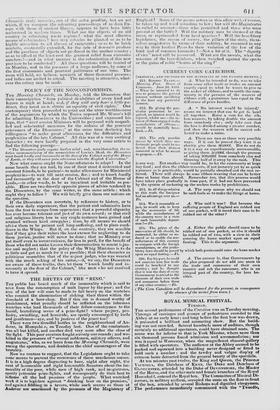THE BRUTES OF THE "RING."
THE public has heard much of the immorality which is said to arise from the consumption of malt liquor by the poor; and the arm of the law stilt soon be made to fail heavy on the wretches who commit the abomination of slaking their thirst within the threshold of a beer-shop. But if this sin is deemed worthy of punishment, what penalty should be inflicted on the inhuman wretches who lead thousands of their fellow-countrymen to the horrid, brutalizing scene of a prize-fight? where peijury, pro- fanity, swindling, and homicide, are openly encouraged by lords and gentlemen—aye, and by justices of the peace too? There were two dreadful battles in the neighbourhood of An- dover, in Hampshi.e, on Tuesday last. One of the combatants was all but killed, and another died very soon after the close of the fight. This poor creature fought seventy-one rounds; and was killed in the presence of" several noblemen, military officers, and magistrates," who, as we learn from the Morning Chronicle, were among the spectators, and doubtless the chief encouragers of the brutality. Now we venture to suggest, that the Legislature ought to take some means to prevent the recurrence of these murderous scenes. It is in a high degree disgusting to hear, night after night, the curt of honourable and right honourable Senators about the im- morality of the poor, while men of high tank, and magistrates, openly patronize prize-fights, and consequently do their best to inflame all the bad passions of the people. What wretched work it is to legislate against "drinking beer on the premises," and against fiddling in a tavern, while such scenes as those at Andover are sanctioned by the presence of the Magistracy of Englaad 1 Some of the poorer actors in this Alinr will. of eonrse, be taken up and 0 ied accoldine to law; but will the Magistrates be called to aceount—those who permitted and the-c who were present at the battle? Will the military men be shunned at the mess, or reprimanded film] head quarters ? Will the hereditary legislators, the cream of society, the pillars of the state, them- selves magistrates by virtue of their nobility, be censured in any way by their brother Peers for their violation of the law of the land and of common burnanit■ ?—Nut a bit of' it. The " dignity of vice" must still be preserved. What are the morals, what the miseries of the beer-drinkers, when weighed against the sports. or the gains of noble "brutes of the ring ?"






















 Previous page
Previous page